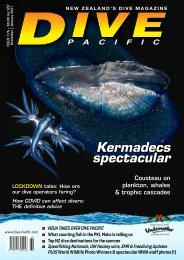Dive Pacific Iss 171 Oct- Nov 2019
New Zealand's dive magazine featuring in this issue: Shooting big sharks, up close; Spearfishing at night!; Remembering a great Kiwi dive pioneer, Wade Doak; Forgotten Vanuatu wreck's claim to fame; The invasive Lionfish - in depth, plus all our expert columnists
New Zealand's dive magazine featuring in this issue: Shooting big sharks, up close; Spearfishing at night!; Remembering a great Kiwi dive pioneer, Wade Doak; Forgotten Vanuatu wreck's claim to fame; The invasive Lionfish - in depth, plus all our expert columnists
Create successful ePaper yourself
Turn your PDF publications into a flip-book with our unique Google optimized e-Paper software.
Reef sharks in Tahiti<br />
Photo Anthony Berberian<br />
Great White about to breach<br />
Staying confident<br />
Maintaining eye contact, showing confidence without<br />
aggression, and projecting awareness is a big part<br />
of staying safe in the water with large sharks, as is<br />
becoming more attuned to their body language.<br />
Spending more time in the water with sharks does<br />
help you understand them better, but it is a mistake<br />
to become complacent around any shark, or think you<br />
can always ‘read’ them. Yes, they usually signal their<br />
mood with body language, but sometimes that mood<br />
can change so quickly they are at warp speed before<br />
you can react.<br />
While regularly diving with sharks makes you more<br />
objective about the relatively low risk of most shark<br />
dives it also hones your respect for them. It pays to<br />
recognise that even a small shark can give you a bite<br />
requiring 20 or 30 stitches. This is not to demonise<br />
sharks, just to acknowledge what they are capable of!<br />
Watch your back<br />
Certainly when filming sharks in open water it is<br />
important to have someone you trust watching your<br />
back. It is pretty difficult to see what is going on<br />
behind you when you’re focused on framing a shot,<br />
and that second pair of eyes makes all the difference.<br />
It also pays to remember that when shooting sharks<br />
with a wide-angle lens, ‘filling the frame’ means the<br />
shark is going to be on your camera dome, literally!<br />
400 million years of evolution has honed sharks into<br />
superb predators, and to my mind one of the beautiful<br />
animals on the planet. I count myself very fortunate<br />
to have had so many opportunities to get into the<br />
water to film these amazing creatures; they are intelligent,<br />
intensely aware, often curious, and incredibly<br />
graceful …don’t ever miss a chance to do a shark dive!<br />
Looming out of the darkness - night dive with a Great White<br />
www.dive-pacific.com 35













